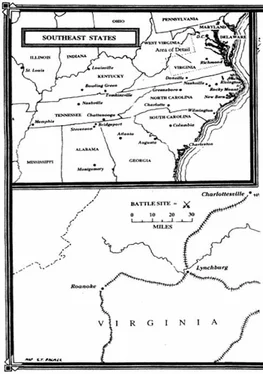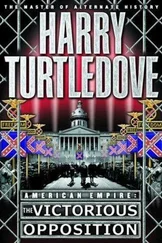Harry Turtledove - The Guns of the South
Здесь есть возможность читать онлайн «Harry Turtledove - The Guns of the South» весь текст электронной книги совершенно бесплатно (целиком полную версию без сокращений). В некоторых случаях можно слушать аудио, скачать через торрент в формате fb2 и присутствует краткое содержание. Год выпуска: 1992, ISBN: 1992, Издательство: Ballantine, Жанр: Альтернативная история, на английском языке. Описание произведения, (предисловие) а так же отзывы посетителей доступны на портале библиотеки ЛибКат.
- Название:The Guns of the South
- Автор:
- Издательство:Ballantine
- Жанр:
- Год:1992
- ISBN:0-345-38468-7
- Рейтинг книги:4 / 5. Голосов: 1
-
Избранное:Добавить в избранное
- Отзывы:
-
Ваша оценка:
- 80
- 1
- 2
- 3
- 4
- 5
The Guns of the South: краткое содержание, описание и аннотация
Предлагаем к чтению аннотацию, описание, краткое содержание или предисловие (зависит от того, что написал сам автор книги «The Guns of the South»). Если вы не нашли необходимую информацию о книге — напишите в комментариях, мы постараемся отыскать её.
The Guns of the South — читать онлайн бесплатно полную книгу (весь текст) целиком
Ниже представлен текст книги, разбитый по страницам. Система сохранения места последней прочитанной страницы, позволяет с удобством читать онлайн бесплатно книгу «The Guns of the South», без необходимости каждый раз заново искать на чём Вы остановились. Поставьте закладку, и сможете в любой момент перейти на страницу, на которой закончили чтение.
Интервал:
Закладка:
Venable made a sour face, as if disliking the taste of that idea. “Not long, sir.”
“I quite agree. They outweigh us enough as is. But he chose our cause instead, so for the time being the hard questions can wait. And he is a pious man. No one who was not would read his Testament late at night where nobody could be expected to see him.”
“Every word you say is true, sir,” Venable said. “And yet—I don’t know—everything Rhoodie has seems too good to be true somehow.”
“The Union has had the advantage in material goods all through the war, Major. Are you saying we are not entitled to our share, or that, if fortune should for once choose to favor us, we ought not to take advantage of it?”
“Put that way, no, of course not, General Lee.”
“Good,” Lee said. “For I intend to wring every drop of advantage from it that I may.”
A plume of woodsmoke announced a train heading up the Orange and Alexandria Railroad to the little town of Orange Court House. Lee pointed to it with the eagerness of a boy who spies his Christmas present being fetched in. “If I have calculated rightly, gentlemen, that will be the train from Rivington. Shall we ride to meet it, and see this first consignment of Mr. Rhoodie’s rifles?”
His aides hurried off to get their horses. Andries Rhoodie went with them. Perry brought up Traveller. Lee swung onto the gray. The staff officers and Rhoodie soon joined them. They rode down from the hills to Orange Court House together. Lee and his aides were all fine horsemen. He soon saw Rhoodie was not, though he managed well enough.
Old civilian men, walking or riding along the streets of Orange Court House, lifted their hats in tribute to Lee as he passed. He gravely returned their greetings. Few young male civilians were to be seen—in the town or anywhere else in the Confederacy. There were a fair number of soldiers, seeing what the shops had to offer: not much, probably. They saluted Lee and his staff officers. Some pointed at Andries Rhoodie: his size, his strange clothes, and the fact that he, a stranger, rode with Lee drew their notice to him.
The train station was not far from the courthouse that gave the hamlet half its name. For that matter, nothing in Orange Court House was far from anything else. The train had already arrived by the time Lee and his companions got to the station. Under the watchful eye of the crew, slaves loaded cut logs into the tender for the next trip south.
Other blacks were starting to unload the freight cars. Some of the men who supervised them wore the Confederate uniform; others were dressed like Andries Rhoodies, in caps and mottled jackets and trousers. Even their ankle boots were the same as his. Lee rubbed his chin thoughtfully. What one man wore was his own business. When a dozen men—a baker’s dozen, counting Rhoodie himself—wore similar outfits, that suggested the clothes were a uniform of sorts. Indeed, Rhoodie’s colleagues looked more uniform than the Southern soldiers with them, whose pants, coats, and hats were of several different colors and cut in a variety of ways.
Behind Lee, Walter Taylor turned to Rhoodie and remarked, “Your friends are all good-sized men, sir.” He was right. The smallest of the men m spotted clothes had to be five feet ten. Most of them were six-footers; two or three were as big as Rhoodie. They all looked well fed, too, in spite of the war and the hard winter. The Confederate soldiers came to attention when Lee and his aides rode up. The men from Rivington did not. A few of them greeted Rhoodie with a nod or a wave. Most just kept calling orders to the slaves, who were taking crates off the train.
“Your fellows here have the same interesting accent as you yourself,” Charles Venable observed.
“We are countrymen,” Rhoodie said blandly. Lee smiled at the major’s polite probe and at Rhoodie’s equally polite but uninformative reply. Rhoodie had given a lot of polite but uninformative replies, the last few days. Lee told himself that a trainload—maybe a great many trainloads—of repeaters and cartridges gave him the right to hold his tongue.
Lee dismounted. His aides and Rhoodie followed him to the ground; Venable hitched Traveller to the rail. A soldier with two bars on either side of his collar walked up to them. His face, Lee thought, was too thin for the whiskers he’d chosen, which were like those of the Federal general Burnside. He saluted. “Asbury Finch, sir, 21st Georgia.”
“Yes, Lieutenant. I received your telegram.”
“Yes, sir.” Finch sent a glance to Andries Rhoodie, who had gone over to greet his comrades. “So you’ve already met one of these all-over-spots fellows, have you, sir? They’ve purely done wonders for Rivington, that they have.”
“I commanded in North Carolina a couple of years ago, Lieutenant, but I must confess I do not remember the town,” Lee said.
“A couple years ago, General Lee, sir, wasn’t nothin’ worth remembering, just a town barely big enough for the train to bother stoppin’ at it. But it’s growin’ to beat the band now, thanks to these folks. A big bunch of ‘em done settled there, bought a raft o’ niggers, and run up new houses and warehouses and I don’t know what all. And all in the last three, four months, too; I heard that from one of the folks who’s lived there all his life while we were takin’ on these crates. They pay gold for everything, too, he says.”
“No wonder they’re welcome, then,” Lee said. Confederate paper money had weakened to the point where a pair of shoes cost a private soldier three or four months’ wages. That was one reason so many men in the Army of Northern Virginia went barefoot even in winter. Another was that there were not enough shoes to be had at any price.
“Pity they couldn’t have come a year ago,” Walter Taylor said. “Think what we might have done with those rifles at Chancellorsville, or up in Pennsylvania.”
“I have had that thought myself a fair number of times the last few days, Major,” Lee said. “What’s past is past, though, and cannot be changed.”
“The guns, they’re as fine as all that, sir?” Finch asked. “They are indeed, Lieutenant,” Taylor said. “With them, I feel we truly may hold in our hands the goose that lays the golden eggs.”
“Or it holds us,” Charles Marshall said, his voice sour.
Lee looked at him sharply. Marshall had not taken to Andries Rhoodie, not at all. But after a moment’s thought, Lee decided he had a point; Trainloads of repeating carbines might save the Confederacy. But if Rhoodie and his friends were the only source for them, they held a hand to the throat of the South. They were not squeezing now—far from it. If, however, they chose to…
“Major Marshall,” Lee said.
“Sir?”
“Please draft a letter to Colonel Gorgas in Richmond. I would like his opinion on the practicability of our manufacturing copies of these weapons, as we do now with the Springfield and Mississippi rifles. When the first shipment of rifles reaches our headquarters, you might also send one and a stock of cartridges to Colonel G.W. Rains in Georgia, who is, I think, the man most expert in the Bureau of Ordnance on matters pertaining to powder. Perhaps he can enlighten us on how these rounds produce so little smoke.”
“I will attend to it, sir,” Marshall said. His spectacles’ wire frames could not hide a raised eyebrow. “Your trust in Mr. Rhoodie is not perfect, then?”
“The only perfect trust is in God,” Lee answered. Marshall smiled and nodded. A relative of the great chief justice, he had been a lawyer till the war began, which gave him another reason besides religion to place perfect trust in no human institution.
Just then, Rhoodie came back to Lee, his staff officers, and Lieutenant Finch. Several of his friends were right behind him. He said, “General, let me introduce some of my comrades. Here are Konrad de Buys, Wilhelm Gebhard, Benny Lang, and Ernie Graaf.”
Читать дальшеИнтервал:
Закладка:
Похожие книги на «The Guns of the South»
Представляем Вашему вниманию похожие книги на «The Guns of the South» списком для выбора. Мы отобрали схожую по названию и смыслу литературу в надежде предоставить читателям больше вариантов отыскать новые, интересные, ещё непрочитанные произведения.
Обсуждение, отзывы о книге «The Guns of the South» и просто собственные мнения читателей. Оставьте ваши комментарии, напишите, что Вы думаете о произведении, его смысле или главных героях. Укажите что конкретно понравилось, а что нет, и почему Вы так считаете.












